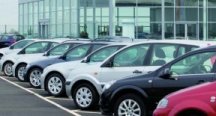List of British car auctions - Email - ads@britishcarauctions.co.uk
| Home page | British car auction tips | Car service tips | Driving on British roads tips | Selling cars tips |


How to get
the most out of the fuel you buy. Car choice plays a big part in the extent
to which your motoring affects the environment, but whatever car you've
got from the car auction there's a number of simple things you can do
to reduce energy use (fuel consumption), CO2 emissions and pollution.
In February 2008, fifty AA employees took part in an eco-driving experiment
in conjunction with Auto Express magazine. Each drove normally for the
first week and then applied our advice (below) to see how much they could
save in the second week.
The group saved an average 10% on their weekly fuel bill with the best achieving an incredible 33% saving!
Maintenance
•Regular Servicing – Get the car serviced regularly (according
to the manufacturer's schedule) to maintain engine efficiency.
•Engine oil – Make sure you use the correct specification of
engine oil (refer to the handbook)
•Tyre pressures – Check tyre pressures regularly and before
long journeys. Under-inflated tyres create more rolling resistance and
so use more fuel. Getting tyre pressures right is important for safety
too. Refer to the handbook as pressures will normally have to be increased
for heavier loads.
Before you go
•Streamline – Roof racks/boxes create extra wind resistance
and so increase fuel consumption. If you don't need it take it off, if
you do, pack carefully to reduce the extra drag.
•Don't get lost – Plan unfamiliar journeys to reduce the chance
of getting lost – try the AA Route planner or consider a 'Sat Nav'
if you regularly drive unfamiliar routes. Check the traffic news before
you go too.
•Combine short trips – Cold starts are inefficient so it pays
to combine errands such as buying the paper, dropping-off the recycling,
or collecting the kids into one trip rather than making multiple short
trips.
•Leave promptly – Don't start the engine until you're ready
to go. This avoids fuel wastage due to unnecessary idling and ensures
that the engine warms up as quickly as possible. (In winter months, scrape
ice rather than leave the car idling for a long period to warm up).
•Easy does it – Drive smoothly, accelerate gently and read the
road ahead to avoid unnecessary braking.
•Decelerate smoothly – When you have to slow down or to stop,
decelerate smoothly by releasing the accelerator in time, leaving the
car in gear.
•Rolling – If you can keep the car moving all the time, so much
the better. Stopping then starting again uses more fuel than keeping rolling.
•Change up earlier – Change gear as soon as possible without
laboring the engine – try changing up at an engine speed of around
2000 rpm in a diesel car or around 2500 rpm in a petrol car. This can
make such a difference to fuel consumption that all cars in the future
are likely to be fitted with Gear Shift indicators that light a lamp on
the dashboard to indicate the most efficient gear change points.
•Cut down on the air-con – Air conditioning increases fuel consumption
at low speeds, but at higher speeds the effects are less noticeable. So
if it's a hot day it's more economical to open the windows around town
and save the air conditioning for high speed driving. Don't leave aircon
on all the time – you should run it at least once a week throughout
the year though to maintain the system in good condition.
•Stick to the limits – Drive at or within the speed limit –
the faster you go the greater the fuel consumption and the greater the
pollution too. According to the Department for Transport driving at 70mph
uses up to 9% more fuel than at 60mph and up to 15% more than at 50mph.
Cruising at 80mph can use up to 25% more fuel than at 70mph.
•Don't be idle – If you do get caught in a queue avoid wasting
fuel by turning the engine off if it looks like you could be waiting for
more than three minutes.
Coasting - does it help save fuel?
Coasting - rolling downhill or approaching a junction with the car out
of gear - is inadvisable because the driver doesn't have full control
of the vehicle, though it used to be quite a common practice to save fuel.
•You lose the ability to suddenly accelerate out of tricky situations.
•You lose engine braking which takes some of the load off the brakes
on down hill stretches and helps to avoid brake fade - overheated brakes
require harder pedal pressures to stop the vehicle.
Old car with carburettor - take your foot off the accelerator pedal with the car in gear and fuel is still drawn through into the engine. Fuel savings could be made by coasting out of gear.
Modern car with electronic engine management - fuel and ignition systems are effectively combined and controlled by one Electronic Control Unit (ECU). Take your foot off the accelerator and the ECU cuts the fuel supply to the injectors anyway so there's nothing to be gained by coasting.
How much
can you save?
The aim is to see how much you can improve on your current average fuel
consumption or the 'official', manufacturer's figure by following the
advice above.
If your car has an onboard computer that records fuel economy (miles per gallon / MPG) then take a note of the overall average fuel consumption you're getting now and then see how much you can improve it by following the 'eco-driving' advice above.
It should be possible to re-set the computer so it starts recording a new average MPG.
With no onboard computer, you'll first need to find out the official, manufacturer quoted fuel consumption for your car. You may see three different figures quoted, 'urban', 'extra-urban' and 'combined' – it's the third, 'combined' figure that you want.
You can look-up fuel consumption data on the Department for Transport's website www.vcacarfueldata.org.uk/ or can find it with other car specification data in our car buyer's guide.










